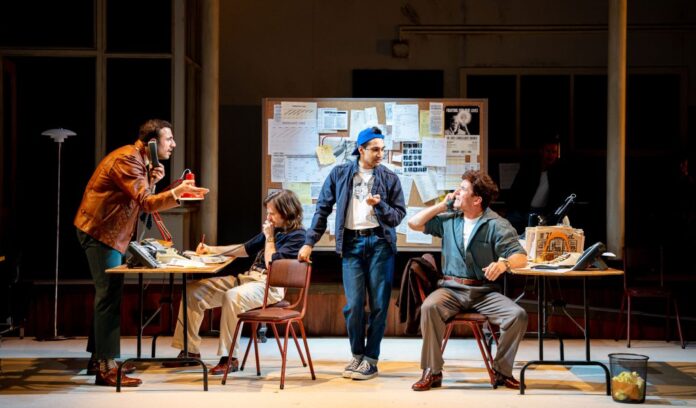The writer and social critic Susan Sontag called him one of America’s most valuable troublemakers. Larry Kramer was the founder of the Gay Men’s Health Crisis, the first organisation formed to respond specifically to the insidious medical calamity that became known as AIDS.
Kramer, a screenwriter, novelist and playwright, also wrote the stage play The Normal Heart – part polemic, part chronicle, elegy and psalm to the gay community in New York between 1981 and 1984. Tony Kushner, who later wrote the Pulitzer-winning Angels in America in 1993, said The Normal Heart changed his world: “He changed the world for all of us.”
The play is energised by impatience, outrage, terror and grief as the central character, Ned Weeks (an acerbic version of Kramer himself), does battle with medicos, the Mayor’s office, The New York Times, his associates in the gay movement and, frequently, himself, as he tries to warn those around him that there’s a plague abroad that is killing them, almost before they know it.
In this memorable State Theatre Company production, skilfully directed by Dean Bryant, Kramer’s play is given fresh impact and relevance as we consider the parallel tensions between medical and political considerations, between science and social expediency, in our present COVID pandemic.
But it is also a disturbing reminder of the indifference and neglect that characterised the first responses to AIDS in the 1980s. Kramer documents the daily reality of diagnosis and decline, the paranoia and recrimination, and the guilt and self-doubt which threatened to extinguish the first glimmerings of gay pride.

The set of The Normal Heart evokes 1980s New York. Photo: Matt Byrne
Designer Jeremy Allen’s spacious, detailed set features high windows on stage right looking into a medical clinic where grimly silent consultations are seen taking place; to the left is an apartment with furniture, a desk and lamp. These are smoothly reconfigured for a variety of scene changes. At the back, behind glass, is a book collection, warmly lit – as is the entire production, by the excellent Nigel Levings. The effect is imposing but the grandeur is undermined by peeling paint and lack of upkeep; threadbare New York in the 1980s.
The music composed by Hilary Kleinig, and performed live on stage by cellist Clara Gillam-Grant and Michael Griffiths on piano, subtly punctuates the action – all effortlessly integrated in Andrew Howard’s sound design.

Live music is integrated into the performance. Photo: Matt Byrne
There are some outstanding performances. Ainsley Melham as Felix, Ned’s newly found lover, powerfully navigates the steep downward path from a carefree life as a fashion writer for The New York Times to discovering the first purple lesion and the debilitating spiral of failing chemo treatments, suffering and despair.
As Mickey and Bruce, Evan Lever and Matt Hyde are reminders of the double life of closeted discretion facing gay professionals in the ’80s. Mickey is a medical writer working for the government, Bruce works for Citibank – speaking out means fear of self-disclosure, a price that draws only impatience and derision from confrontationists like Ned.

Emma Jones delivers a fiery speech as Dr Emma Brookner. Photo: Matt Byrne
Mark Saturno is first-rate as Ned’s steadfast but sometimes mystified elder brother Ben. He is needled and tested by Ned, but despite their stubborn, silent standoffs, Ben never abandons him. Kramer is writing his own brother in this character and Saturno gives him vivid precision.
In other roles, Anthony Nicola brings a sometimes faltering Southern drawl to Tommy Boatwright, the pacifying mediator in the activist group who comes to the fore when Mickey has a meltdown. Michael Griffiths, as Hiram, is the yes man to the Mayor, and AJ Pate contributes as Craig, the first of the group to succumb to the illness, and Grady, the junior volunteer running errands.
A key role is that of Dr Emma Brookner, the medical specialist who is treating a rapid succession of seriously ill young men and also advocating the need for research data and funding from reluctant and evasive authorities.
Brookner is played with stoic kindness and unerring intelligence by Emma Jones; her scenes with Ned are highlights, as is her fiery speech, addressed direct to the audience, demanding reasons why she has been refused recognition as a lead researcher. It is one of several spirited denunciations of prevarication that Kramer builds into his polemic and Jones was deservedly greeted with audience cheers at its completion.

Mark Saturno and Mitchell Butel as brothers Ben and Ned. Photo: Matt Byrne
At the centre of The Normal Heart is the character of Ned Weeks. State Theatre Company artistic director Mitchell Butel takes the lead role and makes it his own. It is a compelling portrait of Ned as abrasive, outspoken and confident in his convictions, but he also finds in Kramer’s text the vulnerability, self-doubt and distrust in himself – and ambivalence over aspects of the Fire Island gay lifestyle of that time.
Butel keeps Ned (and Kramer’s) mercurial questionings intriguing and engaging, even as he captures the impulsive and often neurotic undertones in them. As with the other performers, Bryant’s direction has given him space to explore and discover.
The Normal Heart takes its title from a poem by WH Auden, written on the day war was declared in 1939. It is a play which deals in fears and portents, and it narrates a history which ends in 1985. Thirty-seven years later, we know more of the story and how some of it ended.
This production, performed – as Dean Bryant observes in his notes – by “queer artists (and their joyous allies)”, is a celebration of tangible progress, but is also a sombre reminder of grievous failures of response, respect and justice. The lesson, as Auden famously wrote, is inescapable: “We must love one another or die.”

Get InReview in your inbox – free each Saturday. Local arts and culture – covered.
Thanks for signing up to the InReview newsletter.
The Normal Heart is being presented at the Dunstan Playhouse until October 15.
In a recent interview with InReview, State Theatre Company SA artistic director Mitchell Butel shared his thoughts on the enduring relevance of The Normal Heart and why he was drawn to the lead role of Ned Weeks. Read the story here.
Support local arts journalism
Your support will help us continue the important work of InReview in publishing free professional journalism that celebrates, interrogates and amplifies arts and culture in South Australia.








